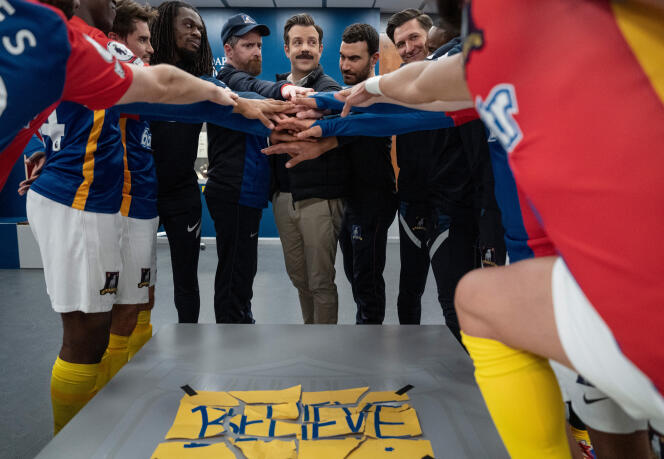A Beacon of Optimism in the World of Ted Lasso
In the cacophony of today’s television landscape, where gritty antiheroes and morally ambiguous plots dominate, Ted Lasso emerges as a beacon of unwavering optimism and genuine heart. This Apple TV+ series, conceived by Bill Lawrence, Jason Sudeikis, Joe Kelly, and Brendan Hunt, follows the eponymous character Ted Lasso (portrayed by Sudeikis), an American college football coach, who inexplicably finds himself coaching the beleaguered English Premier League soccer team, AFC Richmond.
The premise alone is a smorgasbord of potential comedic pitfalls: an American with zero soccer knowledge, thrust into the sophisticated and passion-infused world of British football. Yet, instead of leaning into easy clichés, Ted Lasso transcends its fish-out-of-water narrative, delivering a profound exploration of human connection, cultural exchange, and the transformative power of positivity.

Ted Lasso: Modern-Day Optimism Personified
Ted Lasso is an anomaly in contemporary media—a character whose primary weapon is unyielding optimism. Jason Sudeikis brings to life a man whose folksy charm, relentless kindness, and unfaltering belief in the good of people serve as both his greatest asset and his most glaring vulnerability. Ted’s Kansas-bred sincerity is not just a façade but a deeply ingrained philosophy that he brings to the high-stakes world of professional sports.
Lasso’s coaching style is a radical departure from the norm. Instead of focusing solely on winning, he prioritizes the mental and emotional well-being of his players. This approach is revolutionary, challenging the hyper-masculine and often toxic culture that pervades professional sports. Through Ted, the show proposes a paradigm shift: that empathy, understanding, and personal growth are as crucial as technical prowess on the field.
Gender Dynamics: Breaking the Mold in Sports
One of the most commendable aspects of Ted Lasso is its nuanced portrayal of gender dynamics, particularly within the traditionally male-dominated realm of sports. The series introduces a robust lineup of female characters who are not mere accessories to the male leads but integral to the storyline, each with their own arcs of growth and empowerment.
Rebecca Welton, played by the indomitable Hannah Waddingham, is a case in point. As the newly-divorced owner of AFC Richmond, Rebecca initially hires Ted with the intention of tanking the team to spite her ex-husband, the former owner. However, her character arc is a masterclass in transformation. Over the seasons, Rebecca evolves from a vindictive, embittered woman into a figure of strength, grace, and benevolence. Her friendship with Keeley Jones (Juno Temple) is a revelation—a genuine portrayal of female camaraderie devoid of the stereotypical pettiness often depicted in media.
Keeley herself is a dynamic character, transitioning from a superficial WAG (wives and girlfriends) to a savvy, ambitious PR consultant. Her relationship with Rebecca showcases the power of female mentorship and solidarity, emphasizing that women can uplift and inspire each other in profound ways.




The Heart of Friendship
At its core, Ted Lasso is a celebration of friendship. The relationships between the characters are complex, authentic, and deeply affecting. The bond between Ted and Coach Beard (Brendan Hunt) is particularly noteworthy. Beard’s enigmatic, stoic demeanor complements Ted’s effervescent positivity, creating a dynamic that is both entertaining and touching. Their friendship is a testament to the idea that true friends provide balance and support, even in the most challenging times.
The evolving relationship between Ted and Nathan Shelley (Nick Mohammed) adds another layer of depth to the show. Nathan starts as the timid, overlooked kit man but, under Ted’s encouragement, blossoms into an assistant coach. This journey is not without its bumps; Nathan’s growing confidence sometimes veers into arrogance, creating tension and conflict. This nuanced portrayal of mentorship and personal growth underscores the complexity of human relationships.
Love in Its Many Forms
Love, in its myriad forms, is a central theme in Ted Lasso. Ted’s own struggle with his failing marriage adds a poignant layer to his character. Despite his relentless positivity, Ted is not immune to personal pain. His vulnerability in facing his marital issues humanizes him, making his optimism all the more heroic.
The romantic entanglements of other characters are handled with similar nuance. Keeley and Roy Kent (Brett Goldstein) offer a refreshingly honest portrayal of modern love. Roy, the gruff, aging footballer, finds in Keeley a partner who challenges and supports him in equal measure. Their relationship is neither idealized nor overly dramatized, but rather a realistic depiction of two people navigating the complexities of love and personal growth.
Rebecca’s journey into the dating world post-divorce is another highlight. Her tentative steps towards finding love again are portrayed with sensitivity and realism, showcasing the vulnerability and courage required to open one’s heart after betrayal.

Bridging Cultures: The Comedy and Heart of International Differences
One of the show’s most delightful aspects is its exploration of international differences, particularly the cultural chasm between the American Ted Lasso and his British counterparts. The humor derived from these cultural exchanges is sharp and affectionate. Ted’s bewilderment at British slang, customs, and, of course, the rules of soccer, provides endless comedic fodder. Yet, the show transcends mere humor, using these cultural clashes to foster mutual understanding and respect.
Ted’s genuine curiosity and openness towards British culture pave the way for deeper connections. His interactions with the players, staff, and even the fans of AFC Richmond highlight the potential for growth and empathy that lies in embracing cultural differences. The series suggests that while cultural barriers can be a source of confusion, they can also be an avenue for enriching our understanding of the world and each other.
The Ensemble: A Rich Tapestry of Characters
The strength of Ted Lasso lies not only in its titular character but also in its rich ensemble cast. Each character, no matter how minor, is given depth and dimension, contributing to the overall tapestry of the series.
Jamie Tartt (Phil Dunster), the talented yet arrogant striker, undergoes significant growth throughout the series. Initially portrayed as the quintessential prima donna, Jamie’s journey towards humility and teamwork is compelling. His relationship with his father, a source of deep-seated trauma, is explored with sensitivity, adding layers to his character.
Roy Kent, brought to life by Brett Goldstein, is another standout. Roy’s transition from a grumpy, foul-mouthed veteran to a mentor and leader is one of the show’s most satisfying arcs. His gruff exterior hides a deeply caring individual, and his interactions with his niece, Phoebe, provide some of the show’s most heartwarming moments.
Sam Obisanya (Toheeb Jimoh) is another character whose growth is beautifully portrayed. As a young Nigerian player navigating the pressures of professional football and cultural assimilation, Sam’s journey is a poignant exploration of identity and belonging.





Narrative Arcs and Storytelling
The storytelling in Ted Lasso is both episodic and serialized, allowing for rich character development and engaging plotlines. Each episode offers a self-contained narrative that contributes to the overarching themes of the series. The pacing is deliberate, ensuring that character arcs unfold organically, allowing viewers to invest deeply in the journey.
The writers masterfully balance humor and drama, often within the same scene. The comedic moments are sharp and witty, while the dramatic scenes are handled with a sensitivity that avoids melodrama. This balance is crucial in maintaining the show’s tone, which is both uplifting and grounded in reality.
The Cinematic Aesthetic
Visually, Ted Lasso is a treat. The cinematography captures the charm and vibrancy of the fictional Richmond, with its picturesque locales and quintessentially British settings. The football scenes are shot with a kinetic energy that captures the excitement of the sport, while the quieter, more introspective moments are filmed with a contemplative beauty that highlights the emotional depth of the series.
The Soundtrack: A Melodic Journey
The soundtrack of Ted Lasso deserves special mention. The music is carefully curated to enhance the emotional resonance of each scene. From the upbeat anthems that accompany the team’s victories to the soulful ballads that underscore moments of introspection, the soundtrack is an integral part of the show’s storytelling.

Defying Clichés in the World of Soccer
Ted Lasso masterfully defies clichés commonly associated with sports dramas, particularly those centered around soccer. This subversion not only breathes fresh life into the genre but also underscores the series’ commitment to originality and depth. Here’s how the show dismantles and redefines these well-worn tropes:
The Underdog Coach with a Twist
The classic underdog story is a staple in sports narratives: a coach with unconventional methods takes on a failing team and leads them to victory. Ted Lasso adheres to this formula in its broad strokes but diverges significantly in execution. Unlike typical underdog coaches who often possess hidden tactical genius, Ted’s lack of soccer knowledge is genuine. His expertise lies not in strategy but in psychology and empathy. This twist shifts the focus from tactical prowess to emotional intelligence, emphasizing that success in sports, and life, hinges on human connection and morale as much as on skill and strategy.
The Hardened Veteran
Roy Kent, played with gruff charm by Brett Goldstein, starts as the archetypal hardened veteran—an aging player whose best days are behind him. However, Roy’s character is not confined to this stereotype. Beneath his tough exterior lies a deeply introspective individual grappling with his identity and future beyond the sport. His relationship with Keeley and his interactions with his niece, Phoebe, reveal a tender, nurturing side, challenging the notion that masculinity in sports must be synonymous with emotional repression.

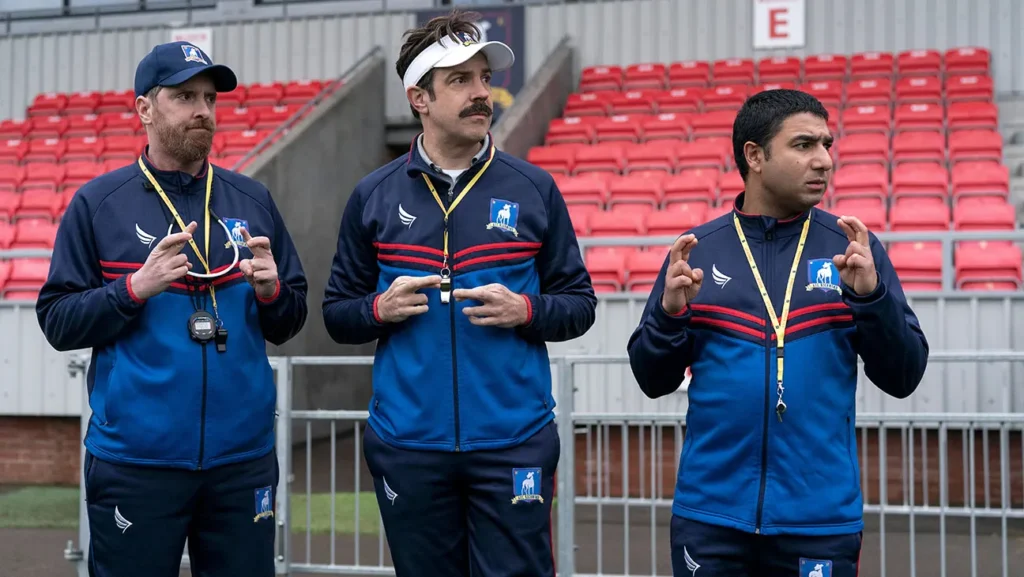



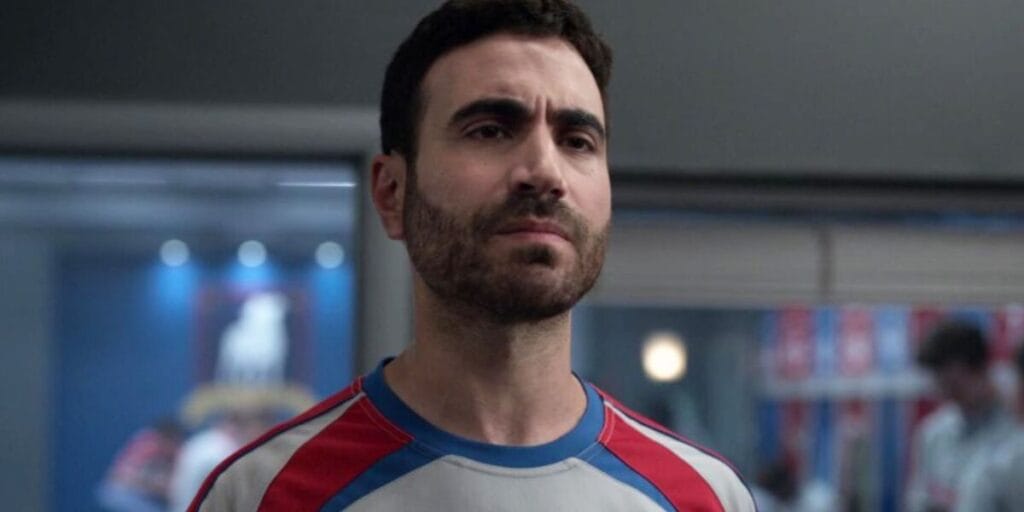
The Ego-Driven Star Player
Jamie Tartt (Phil Dunster) initially fits the mold of the ego-driven star player—a talented, arrogant individual more concerned with personal glory than team success. Yet, the show deftly explores the roots of Jamie’s behavior, revealing the pressure and emotional abuse from his father. This backstory adds depth to his character, transforming him from a one-dimensional antagonist into a sympathetic figure striving for redemption. His journey towards humility and teamwork is nuanced and realistic, illustrating the potential for personal growth even in the most seemingly self-centered individuals.
The Cold and Calculating Owner
Rebecca Welton’s character arc is another brilliant subversion of cliché. Introduced as a cold, calculating owner bent on revenge, Rebecca’s motivations are rooted in pain and betrayal. As the series progresses, her façade crumbles, revealing a woman of immense strength and vulnerability. Her evolving relationship with Ted and the team highlights her capacity for forgiveness and growth, painting a more complex portrait of a sports team owner than typically portrayed in media.
The Silent Support Staff
Nathan Shelley (Nick Mohammed) begins as the quintessential overlooked support staff—the kit man who blends into the background. However, Ted Lasso flips this cliché on its head by giving Nathan a significant character arc. Under Ted’s mentorship, Nathan blossoms into a confident, albeit sometimes conflicted, assistant coach. His journey from invisibility to prominence underscores the importance of recognizing and nurturing talent in all its forms, not just in the star players.
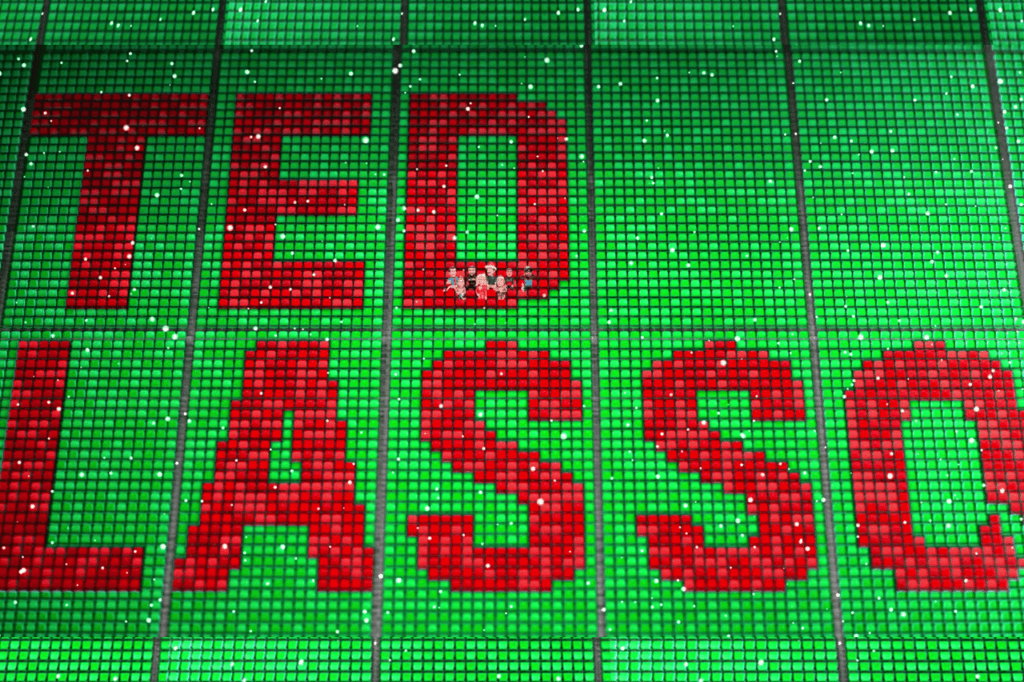
Women in Sports: More Than Eye Candy
Keeley Jones (Juno Temple) starts off as the stereotypical WAG, whose primary role is to support her boyfriend. Yet, Keeley quickly breaks out of this mold, emerging as a formidable PR consultant and businesswoman. Her character demonstrates that women in sports contexts have agency, ambition, and expertise beyond their relationships with male athletes. Keeley’s friendship with Rebecca further emphasizes the theme of female empowerment and solidarity, challenging the notion that women must compete against each other.
Cultural Differences Played for Depth, Not Just Laughs
The cultural differences between Ted and his British counterparts are a rich source of humor, but they also serve a deeper purpose. Instead of playing these differences solely for laughs, the show uses them to foster mutual understanding and respect. Ted’s genuine curiosity about British culture and his willingness to learn from his mistakes highlight the value of openness and adaptability. This nuanced approach contrasts with the often superficial portrayal of cultural clashes in other media, where such differences are typically reduced to mere punchlines.
A New Standard for Sports Narratives
By defying these clichés, Ted Lasso sets a new standard for sports narratives. It enriches its characters with depth and complexity, ensuring that their journeys resonate on a profound level. The show’s commitment to subverting stereotypes and embracing originality makes it a refreshing and inspiring watch, transcending the confines of its genre to deliver universal truths about humanity, resilience, and the transformative power of positivity.
In the world of Ted Lasso, every character, no matter how initially stereotypical, has the potential for growth and redemption, mirroring the unpredictable and often uplifting nature of real life. This commitment to depth and authenticity is what elevates Ted Lasso from a mere sports comedy to a significant cultural phenomenon, resonating with audiences far beyond the soccer field.
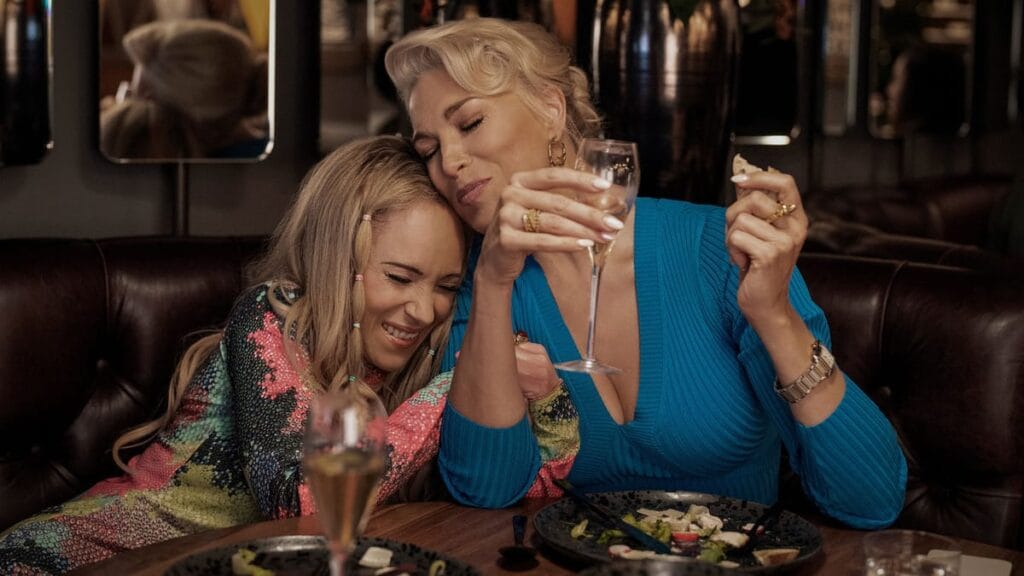







A Revolutionary Era of Television
In an era where television often mirrors the cynicism and fragmentation of the real world, Ted Lasso stands out as a beacon of hope and humanity. Its deft handling of complex themes—gender dynamics, friendship, love, and international differences—wrapped in a package of humor and heart, makes it a significant cultural touchstone.
The series is a reminder that kindness, empathy, and optimism are not just feel-good platitudes but powerful tools for navigating the complexities of modern life. As AFC Richmond’s improbable journey unfolds, so too does a story that resonates on a universal level. Ted Lasso is not just a show about soccer; it’s a testament to the resilience of the human spirit and the transformative power of believing in one another.
Whether you’re a sports fan or not, Ted Lasso is a must-watch. It’s a celebration of the best in all of us, a call to embrace our differences, and a testament to the enduring power of positivity. In the world of Ted Lasso, kindness is contagious, and there’s always hope on the horizon.
